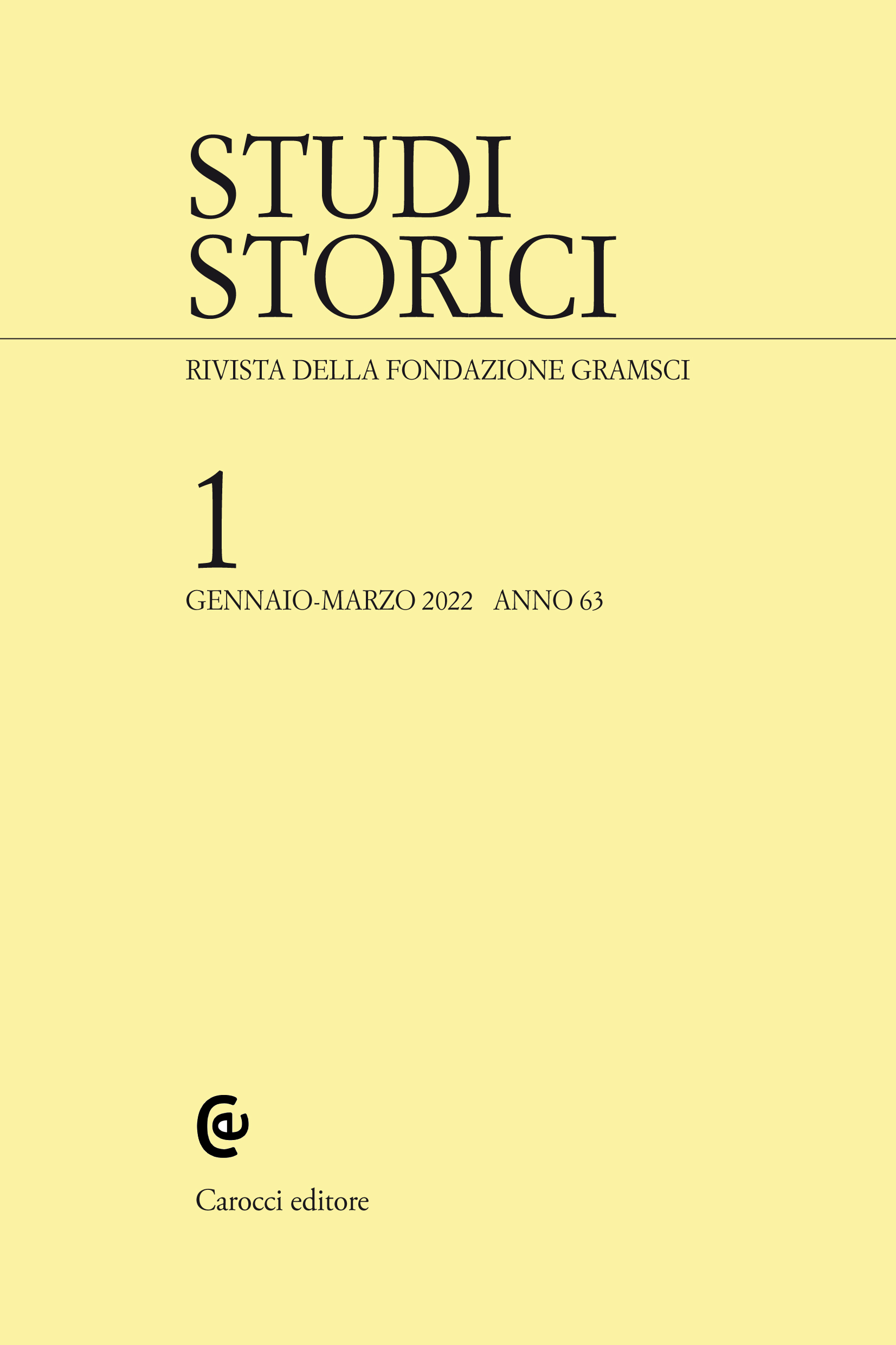
gennaio - marzo 2022 anno 63
Sommario e abstract degli articoli
Ugo Fantasia, pp. 5-40
Un nuovo «miracolo greco»? L ’economia della Grecia antica cinquant’anni dopo Finley
A New “Greek Miracle”? The E conomy of Ancient Greece Fifty Years after Finley
After the heated debate which, at the end of the last century, followed the publication of M. Finley’s The Ancient Economy (1973), the studies of the last twenty years on the economy and economic history of Ancient Greece – as well as those on the Roman economy – mostly used the new institutional economics as a theoretical and methodological framework. This approach would be sufficiently flexible – due to the importance it attributes to the “structure” (that is institutions) in defining the operation of the economy – to allow the opposition between formalists and substantivists to be overcome. In actuality, it ended up favoring the “performance” side, insisting on an alleged great, almost unequalled, economic growth of Archaic and Classical Greece (sometimes defined as a new “Greek miracle”). The article aims, on the one hand, to make a critical assessment of this latter strand of scholarship, and, on the other, to investigate its cultural and ideological assumptions and to point out, alongside the merits, the limits of the new modernism into which it eventually merged.
Keywords: Ancient Greece, Economic history, Finley’s impact, New institutional economics, Greece’s economic growth.
Parole chiave: Grecia antica, Storia economica, Impatto dell’opera di Finley, Teoria economica neoistituzionale, Crescita economica della Grecia.
Ricerche
Alberto Luongo, pp. 41-67
Assistenza pubblica e identità civica nelle terre toscane (metà XIII-XIV secolo)
Public Assistance and Civic Identity in Tuscan Terre (Mid-13th-14th Century)
The essay presents the outcomes of a comparative study of the public welfare systems in six small Tuscan towns (terre or “quasi città”) in the 13th and 14th centuries (Prato, Montepulciano, Montalcino, San Gimignano, San Miniato, Poggibonsi). While all distinguished by the absence of an episcopal see, these towns were characterised by political, economic and demographic dimensions comparable to those of many civitates (towns with an episcopal see and a stronger tradition of urban rule). The lack of episcopal power allowed the communal governments to build a more centralized welfare system, based on a small set of civic hospitals closely controlled by public authorities. In some cases, control of the hospitals became a strong symbol of civic identity, as shown by the communes’ conflicts against major towns or their episcopal sees to preserve it. The final part of the essay attempts to establish to what extent this Tuscan model can be extended to other areas of Central and Northern Italy.
Keywords: Hospitals, Tuscany, Welfare, Small towns, Civic identity.
Parole chiave: Ospedali, Toscana, Welfare, Quasi città, Identità civica.
Domenico Maione, pp. 69-99
Popoli stranieri in repubbliche sorelle. Cittadinanza e mobilità nel triennio 1796-1799
Foreign Peoples in Sister Republics. Citizenship and Mobility during the Triennium 1796-1799
This essay on the Republican Triennium aims to reconstruct both the practices to control the travellers moving between the main State areas of the Italian peninsula and the procedures that people interested in obtaining naturalisation in these territories had to undergo. The purpose is to bring together two historiographical strands – the administration of mobility and the attribution of citizenship – which are still far from being synthesised on a methodological level in spite of their convergent themes. Adopting a multifocal and comparative analytical perspective, the paper focuses on both legislation and practice, and compares the administrative models of the Cisalpine, Roman and Neapolitan Republics.
Keywords: French revolution, Border control, Passport, Security card, Naturalisation.
Parole chiave: Rivoluzione francese, Controllo di frontiera, Passaporto, Carta di sicurezza, Naturalizzazione.
Ludovico Matrone, pp. 101-132
Ordine pubblico e repressione. I tumulti di Torino per il trasferimento della capitale
Public Order and Repression: Turin’s Riots against the Capital’s Relocation
In September 1864, the news of the transfer of Italy’s capital to Florence caused widespread popular discontent in Turin. Ideals and economic considerations led people to protest against an act considered an injustice to the detriment of the city, perpetrated by a government that appeared to be anti-Piedmontese and subordinate to a foreign power: France. The riots degenerated on 21 and 22 September, when Carabinieri and guards opened fire on the crowd, causing numerous victims. The seriousness of the incident fuelled controversy and raised suspicion of the presence of provocateurs among the demonstrators, a thesis taken up by recent historiography. Through the use of unpublished sources, the essay analyses the Turin riots from a different perspective, focusing on policing mechanisms and the action of law enforcement agencies, considering both the time’s political/social context and the poor skills of the men entrusted with managing the public order.
Keywords: Turin in 1864, Italy’s capital relocation, Riots, Public order.
Parole chiave: Torino nel 1864, Trasferimento della capitale, Tumulti, Ordine pubblico.
Fiamma Lussana, pp. 133-164
Nilde Iotti e l’emancipazionismo di tipo nuovo nell’Italia del dopoguerra
Nilde Iotti and a New Model of Women’s Emancipation in Post-War Italy
In Post-War Italy, Nilde Iotti developed a new idea of women’s emancipation, which went beyond the ideological scheme of the emancipationist tradition firmly rooted within the Italian Communist Party. Her original way of thinking anticipated some themes of feminist thought in the 1960s and 1970s. In Iotti’s vision, women’s emancipation meant not only achieving full parity and equality with the other sex, but also changing the mentality and culture that still heavily penalized women’s lives. During the 1970s, in the period preceding her rise to the summit of national political institutions, Iotti was to work with great commitment towards the approval of advanced social laws aimed at modernizing Italy and changing the lives of women in politics and society.
Keywords: Nilde Iotti, Post-war Italy, Women’s emancipation, Subjective consciousness, Feminist movement.
Parole chiave: Nilde Iotti, Italia del dopoguerra, emancipazione femminile, Coscienza soggettiva; movimento femminista.
Mauro Forno, pp. 165-194
Elettorale, femminista, sofferente, social. La Madonna nella stampa italiana dell’ultimo settantennio
Electoral, Feminist, Suffering, Social. The Madonna in the Italian Society of the Last Seventy Years
In Italy, during the decades between the end of the Second World War and the beginning of the new millennium, the figure of Our Lady, Mary of Nazareth, was assiduously present in the media. This essay intends to systematically investigate the cyclical trends of this presence, attempting to identify the historical phases in which it reached the highest and lowest levels in the pages of certain newspapers and to link this trend to the political, social and cultural transformations taking place in the country. It will therefore focus on the emergence of a feminine Mariology, linked to the incipient processes of women’s emancipation; on the recourse to the Madonna in a purely political and electoral key; on the explosion of a Marian presence interpreted in a visionary and miraculous perspective; and on its use as an instrument of division or dialogue.article reflects on the book by Margherita Losacco, Leggere i classici durante la Resistenza. La letteratura greca e latina nelle carte di Emilio Sereni, Roma, Edizioni di Storia e Letteratura, 2020.
Keywords: Mary of Nazareth, Marian cult, Political use of religion, Miracles and apparitions.
Parole chiave: Maria di Nazareth, Culto mariano, Uso politico della religione, Miracoli e apparizioni.
Valerio Marinelli, pp. 195-225
A proposito di un libro rimasto inedito su M ariano Rumor e il doroteismo
An Unpublished Book on Mariano Rumor and Doroteismo
Between 1974 and 1976, Ugo Baduel, then the political notist of Communist Party secretary Enrico Berlinguer, wrote a book to explore the personality of Mariano Rumor and the political and cultural roots of one of the main currents in the Christian Democratic Party, the Dorotei. Baduel was commissioned to write the book by the publishing house Feltrinelli, which afterwards never sent it to press. The essay aims to analyse the general characteristics of Baduel’s work, attempting to grasp the political and personal reasons for the author’s particular interpretative approach. Baduel tries to show how, in Rumor’s personality and attitude, an “anima dorotea” may be found before the current was officially born.
Keywords: Mariano Rumor, Christian democratic party, Doroteismo, Ugo Baduel, Feltrinelli.
Parole chiave: Mariano Rumor, Democrazia cristiana, Doroteismo, Ugo Baduel, Feltrinelli.
Note critiche
David Bidussa, pp. 227-237
La lettura come pratica e come conforto
The Act of Reading both as Practise and as Solace
This article reflects on the book by Margherita Losacco, Leggere i classici durante la Resistenza. La letteratura greca e latina nelle carte di Emilio Sereni, Roma, Edizioni di Storia e Letteratura, 2020.
Keywords: Margherita Losacco, Emilio Sereni, Italian Resistance.
Parole chiave: Margherita Losacco, Emilio Sereni, Resistenza italiana.
Sfoglia gli altri numeri dell’anno 63 / 2022
Elenco dei fascicoli pubblicati dal 2010
Seleziona fascicolo...
- anno 65 / 2024
- 1
- 2
- anno 64 / 2023
- 1
- 2
- 3
- 4
- anno 63 / 2022
- 1
- 2
- 3
- 4
- anno 62 / 2021
- 1
- 2
- 3
- 4
- anno 61 / 2020
- 1
- 2
- 3
- 4
- anno 60 / 2019
- 1
- 2
- 3
- 4
- anno 59 / 2018
- 1
- 2
- 3
- 4
- anno 58 / 2017
- 1
- 2
- 3
- 4
- anno 57 / 2016
- 1
- 2
- 3
- 4
- anno 56 / 2015
- 1
- 2
- 3
- 4
- anno 55 / 2014
- 1
- 2
- 3
- 4
- anno 54 / 2013
- 1
- 2
- 3
- 4
- anno 53 / 2012
- 1
- 2
- 3
- 4
- anno 52 / 2011
- 1
- 2
- 3
- 4
- anno 51 / 2010
- 1
- 2
- 3
- 4
